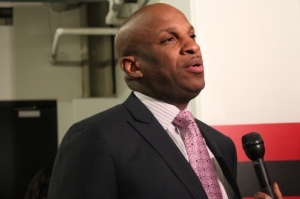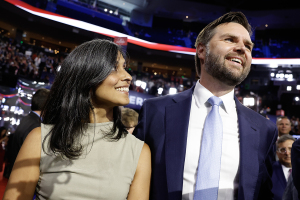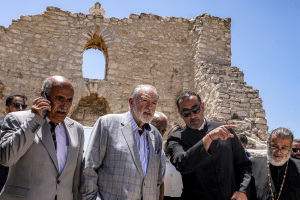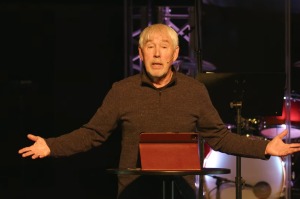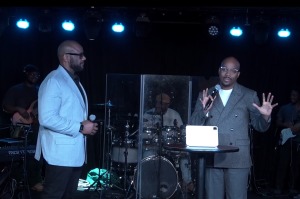Conservative Anglicans See No Change in 'American Problem'
What The Episcopal Church had hoped to be a "clear and unambiguous" statement has left both sides of the Anglican divide dissatisfied, with some saying the Episcopal bishops are again dodging their response to avoid losing their place in the global communion.
"I'm saddened but not surprised," said the Rt. Rev. Martyn Minns, missionary bishop of the Anglican breakaway CANA (Convocation of Anglicans in North America), in a teleconference on Wednesday. "I think basically they ducked. The response they've offered does not clarify as was requested."
The Episcopal House of Bishops affirmed Tuesday that they would "exercise restraint by not consenting to the consecration of any candidate to the episcopate whose manner of life presents a challenge to the wider church and will lead to further strains on communion," essentially ceasing the consecration of gay bishops. They also pledged not to authorize the blessing of same-sex unions until a broader consensus emerges in the Communion, or until General Convention takes further action.
At the same time, the bishops called for "unequivocal and active commitment to the civil rights, safety, and dignity of gay and lesbian persons."
The statement was released at the conclusion of a six-day meeting in New Orleans.
The response by The Episcopal Church – the U.S. branch of Anglicanism – was offered as an attempt to "mend the tear" in the Anglican Communion which has been wracked particularly since it consecrated openly gay bishop V. Gene Robinson in 2003.
Anglican bishops set a Sept. 30 deadline for The Episcopal Church to respond to their requests – which were a culmination of years of conversations – that they make an unequivocal pledge not to consecrate another openly gay bishop or authorize same-sex unions. Conservative leaders have more specifically called for a "heartfelt repentance" and "genuine change" to get back in line with the communion and with Scripture, as many of the bishops in the Global South has stated.
Many Episcopal bishops showed support for the statement, saying it represents the current reality of where The Episcopal Church stands. But conservatives were disappointed in the Episcopal response, which they say indicated no change in their stance on homosexuality among other issues.
"It's business as usual," said Minns, who is currently in Pittsburgh, Pa., with 50 other orthodox Anglicans to discuss how to up the level of their "Common Cause Partnership" as they see The Episcopal Church walking apart from the global Anglican family.
"I think it's clear the American church wants to continue its way and to ignore the persistent requests that have been made from the rest of the communion," the CANA bishop noted.
Supporters of gay clergy, meanwhile, accused the Episcopal bishops of caving in to pressure from conservatives, according to The Associated Press.
Furthermore, a number of media outlets, including the British Broadcasting Corp., had viewed the Episcopal response as an agreement to halt the ordination of gay clergy.
"Bishop [Neil] Alexander [of Atlanta] said that he hoped for a 'clear and unambiguous' statement from the bishops. Well, judging by the initial media response, the statement released Tuesday night falls short of 'clear and unambiguous,'" noted respected theologian Dr. R. Albert Mohler, the president of Southern Baptist Theological Seminary and one of America's pre-eminent evangelical leaders.
"Mark yesterday (Tuesday) as another date of disaster in New Orleans," he wrote in his weblog.
While Episcopal bishops said they "believe" their responses to the Anglican Communion "provide clarity and point toward next steps in an ongoing process of dialogue," breakaway Anglicans were looking for a more clear-cut statement on the U.S. church body's stance rather than the middle ground they chose to take.
"I would have preferred that they would pull back and say that 'we've gone too far' and say that 'we've got to get back in line with the rest of the church and the price of what we're looking for is too high,'" said Minns, who often calls the controversy the "American problem."
The other option would be to stand up for what they believe in, mainly a pro-gay stance, and be willing to pay the price for it, Minns added.
"I guess I was looking for clarity on either end of that," he said. "But what they've done is stay in the middle."
Although controversy in the communion heightened over homosexuality, the larger issue comes down to both the authority of Scripture and mutual submission within the community of faith, Minns explained.
"I believe that in fact that part of what we're looking at is the church that wants a sanction to go its own way without respect to the mind of view of others," he said.
Episcopal leaders have indicated that they will not go "backward" on their 2003 decision to consecrate Robinson and are further appealing Archbishop Rowan Williams, the Anglican spiritual head, for Robinson's invitation to the 2008 Lambeth Conference – a global Anglican gathering that takes place ever 10 years.
While the communion calls for the pastoral care of all people, including homosexuals, it does not support openly gay priests serving in a pastoral role. Anglican bishops are to live out in their own lives the teaching that they proclaim, Minns explained, and if they live in a deliberate contradiction to what they teach or to what the organization they serve teaches, they are not effective. The Anglican Communion rejects homosexual practice as incompatible with Scripture.
In an initial response to the Episcopal statement, Nigeria Archbishop Peter Akinola, arguably considered the most powerful Anglican leader, said it "seems clear from first reading that what is offered is not a whole hearted embrace of traditional Christian teaching."
"The unequivocal assurances that we sought have not been given; what we have is a carefully calculated attempt to win support to ensure attendance at the Lambeth Conference and continued involvement in the life of the Communion," he commented.
Some are hoping the Episcopal statement will make room for more dialogue to keep the Anglican family together, but conservatives believe they're at the end of lobbying back and forth as they have been doing for the past decade.
"The meeting in Dar es Salaam basically said this is one last chance," Minns stated, referring to the gathering of Anglican leaders, called primates, in February, at which they drafted their ultimatum and warned that The Episcopal Church would face consequences for full participation in the communion if a response is not given "in good conscience."
With congregations discontent and "hurting" in The Episcopal Church and after some 10 years of meetings and still no movement, orthodox Anglican leaders said they can't remain silent any longer, said Minns.
"The reality of division is becoming clearer by the minute," he stated. "We need to move forward."
Primates who made the requests are now expected to respond to the Episcopal statement and acknowledge its adequacy or lack thereof.











